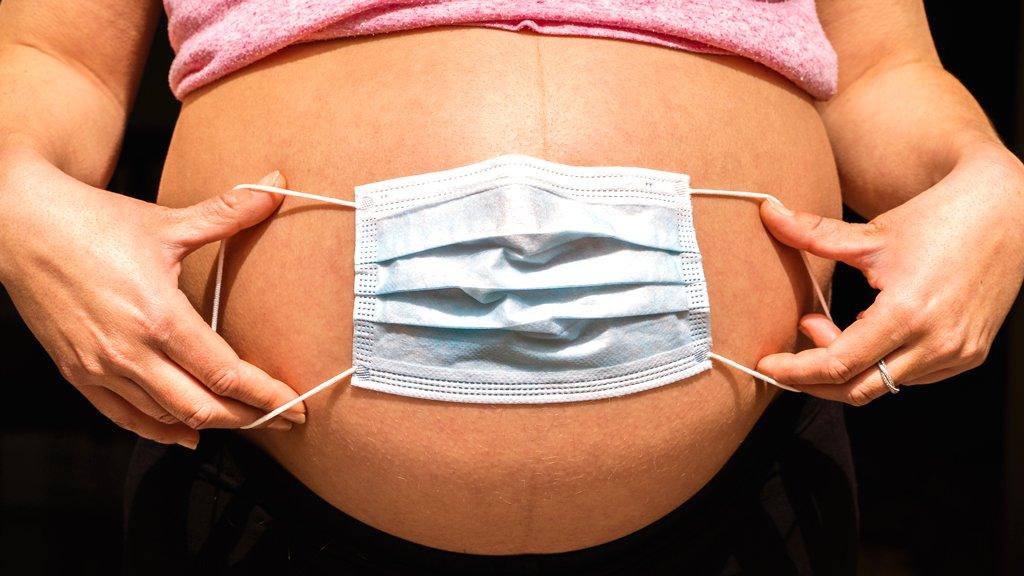Coronavirus: The fight to get partners back into maternity wards
- Published
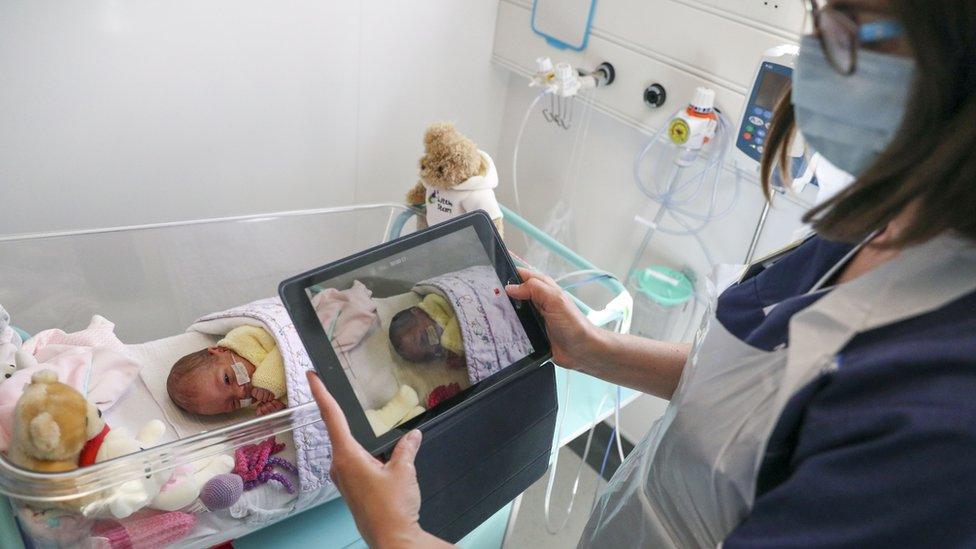
Restrictions on dads and partners attending antenatal appointments and births were put in place at the start of the coronavirus pandemic
The restrictions caused by coronavirus have piled particular pressures on thousands of parents expecting babies in the UK this year.
Initially during lockdown, expectant dads and partners were unable to attend maternity appointments and early stages of labour, with some even missing their children's birth.
But in June, and again in September, NHS England advised hospital trusts, external to reintroduce birthing partners, with Health Secretary Matt Hancock saying partners should be present "throughout each stage of pregnancy".
Despite this, campaign group Pregnant Then Screwed has said 49% of all hospital trusts still have restrictions on maternity unit visitors in place.
One MP - Alicia Kearns from Leicestershire - has called the situation "heartbreaking and horrific".
Meanwhile, an online petition calling on partners to be allowed into hospitals throughout the birthing process, not just established labour,, external has received more than 415,000 signatures.
What effect is the uncertainty having on families?

'I was told to go home and missed the birth'
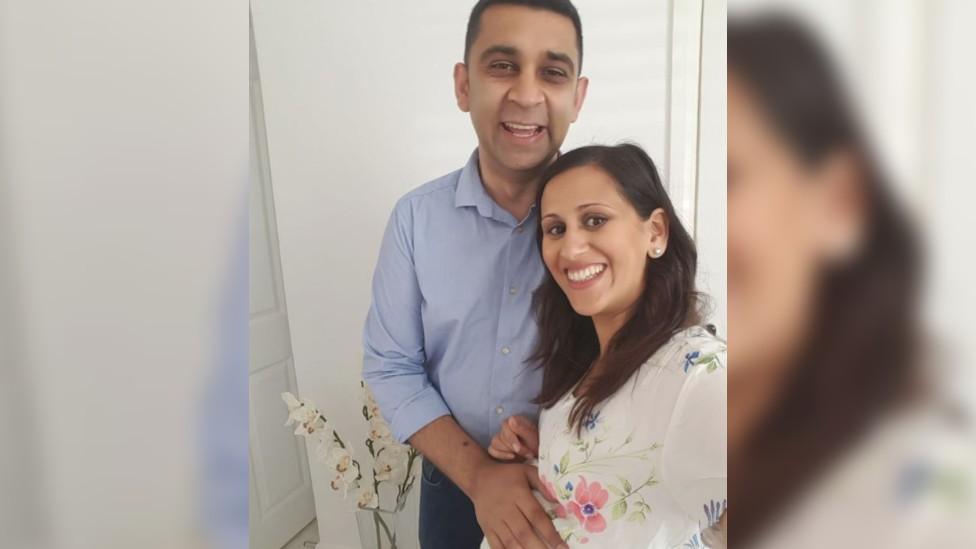
Mehul and Jigisha Solanki had their first child, Ellara in July, but Mehul missed the birth
Mehul and Jigisha Solanki had their daughter Ellara on 3 July.
Mehul, a software designer from Milton Keynes, said he was told to go home after his wife was induced.
He said: "Between the time it took her to call me and say, 'Get here, the baby's on the way,' and the 12 minutes it took me to drive to the hospital, I'd missed the birth.
"We didn't find out the sex of the child because Jigisha wanted me to be the one to tell her at the birth. It was going to be a special moment for us.
"But eliminating me from that process and me not being there meant I couldn't do that. It was gutting."
Jigisha said she missed the support Mehul could have given her during her short labour.
"I think it's an important moment, to see the birth of your child," she said. "And I do think he's been robbed of that a bit."
Milton Keynes University Hospital NHS Foundation Trust said since 9 July expectant mothers can be accompanied "for all antenatal appointments and during the birth of their baby".

'You can go into a pub but I couldn't see my wife'
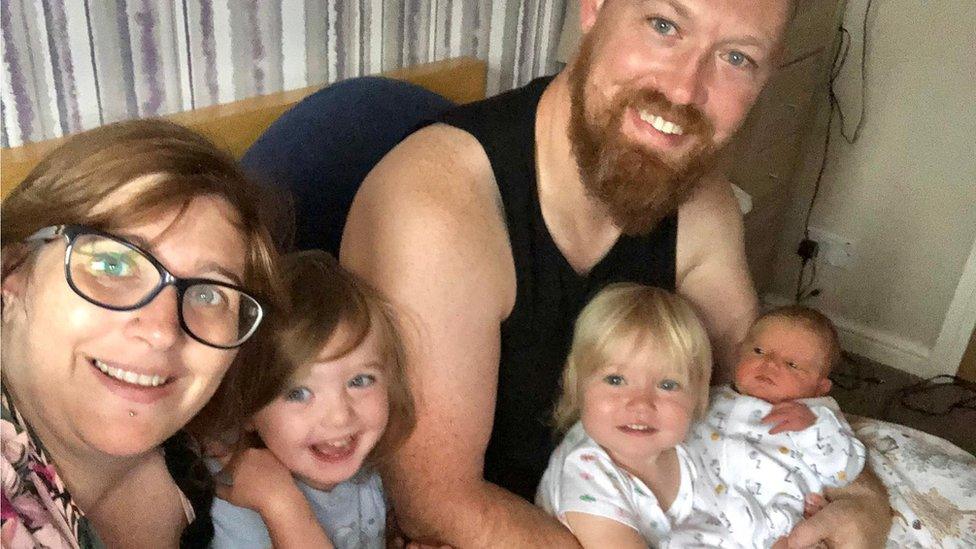
Kate Holmes was forced to have an emergency caesarean without the support of her husband Matt
When Kate Holmes had to attend an emergency scan for her third child in August, after concerns that her foetus had limited movement, she was unable to take her husband Matt with her.
The scan led to an immediate emergency caesarean as she gave birth to their daughter Harriet.
"The worst part was him not being able to be on the ward afterwards, when I was really struggling with my emotions, to the point that I was having anxiety attacks," said the 36-year-old from Nottingham.
At Chesterfield Royal Hospital, where Kate gave birth, partners were limited to one-hour visits.
Matt, 40, said: "Everyone understands all the Covid precautions, but there's got to be a way for me to spend more than an hour with my wife, who's on her own, and our newborn child's in intensive care.
"You can go to a pub, but I can't go and have a cup of tea with my wife while she's recovering from giving birth."
Chesterfield Royal said one birthing partner has always been able to attend the birth as soon as the mother entered labour, but visiting was restricted.

'That moving image is really important'
Ellie Jones, from Nottingham, said she has also suffered as a result of the inconsistency between hospital trusts.
She is 37 weeks pregnant, having miscarried with twins during a pregnancy in 2019, but her partner Matt has been unable to attend the appointments at Nottingham City Hospital.
She said: "The hospital doesn't let you take any video recordings.
"You do get a photo but it's a still image.
"When you've lost a baby and you've seen still images of babies that aren't moving anymore, that moving image is really important.
"But Matt hasn't been able to see those moving images."
Other trusts around the country have allowed mothers, at the height of the pandemic, to take videos of ultrasounds.
"The way different trusts have reacted makes it feel really unfair," she added. "Some trusts have been good and let women take a short 10-second clip of a scan.
"Whereas when we've asked about it, they've said, 'That's not what it's for'."
Nottingham University Hospitals NHS Trust said women could now bring in a partner to 12 and 20 week "routine scan appointments".

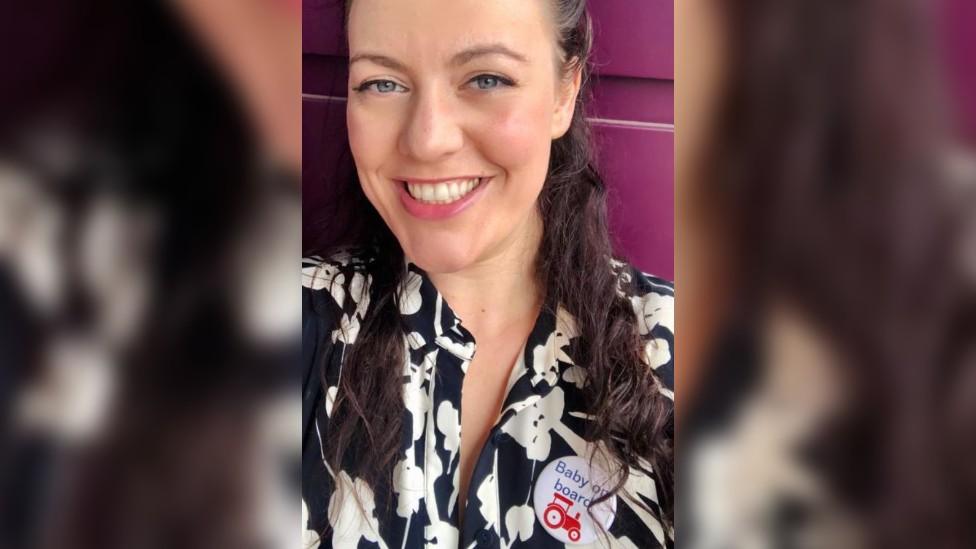
Leicestershire MP Alicia Kearns has been campaigning for hospitals to let partners support pregnant women "at all stages of labour"
MP Alicia Kearns can readily identify with the heart-rending decisions facing many new parents during 2020.
The Conservative MP for Melton and Rutland is five months pregnant and has been calling on all NHS Trusts to adopt the government maternity guidance.
Ms Kearns said: "Clinicians in hospitals have told me they've never seen maternity wards with so many women crying.
"The mental health repercussions cannot be underestimated; I think they're absolutely enormous.
"It is imperative that mothers have their support systems and advocates with them at all stages of labour and scans, and partners aren't locked outside."
She said she has received the backing of 71 MPs including the Health Secretary and PM.
Campaign group Pregnant Then Screwed is also supporting her campaign.
Founder Joeli Brearley said hospitals needed to "prioritise the needs of pregnant women to ensure they have the critical support they need from a partner or trusted person".

Follow BBC East Midlands on Facebook, external, Twitter, external, or Instagram, external. Send your story ideas to eastmidsnews@bbc.co.uk, external.
- Published11 September 2020
